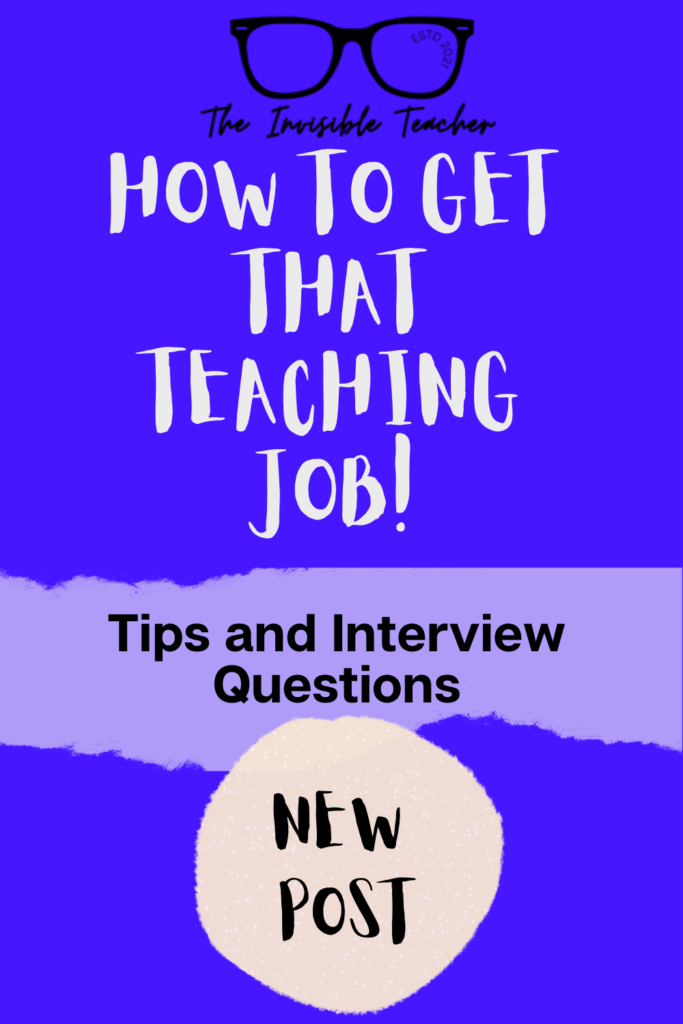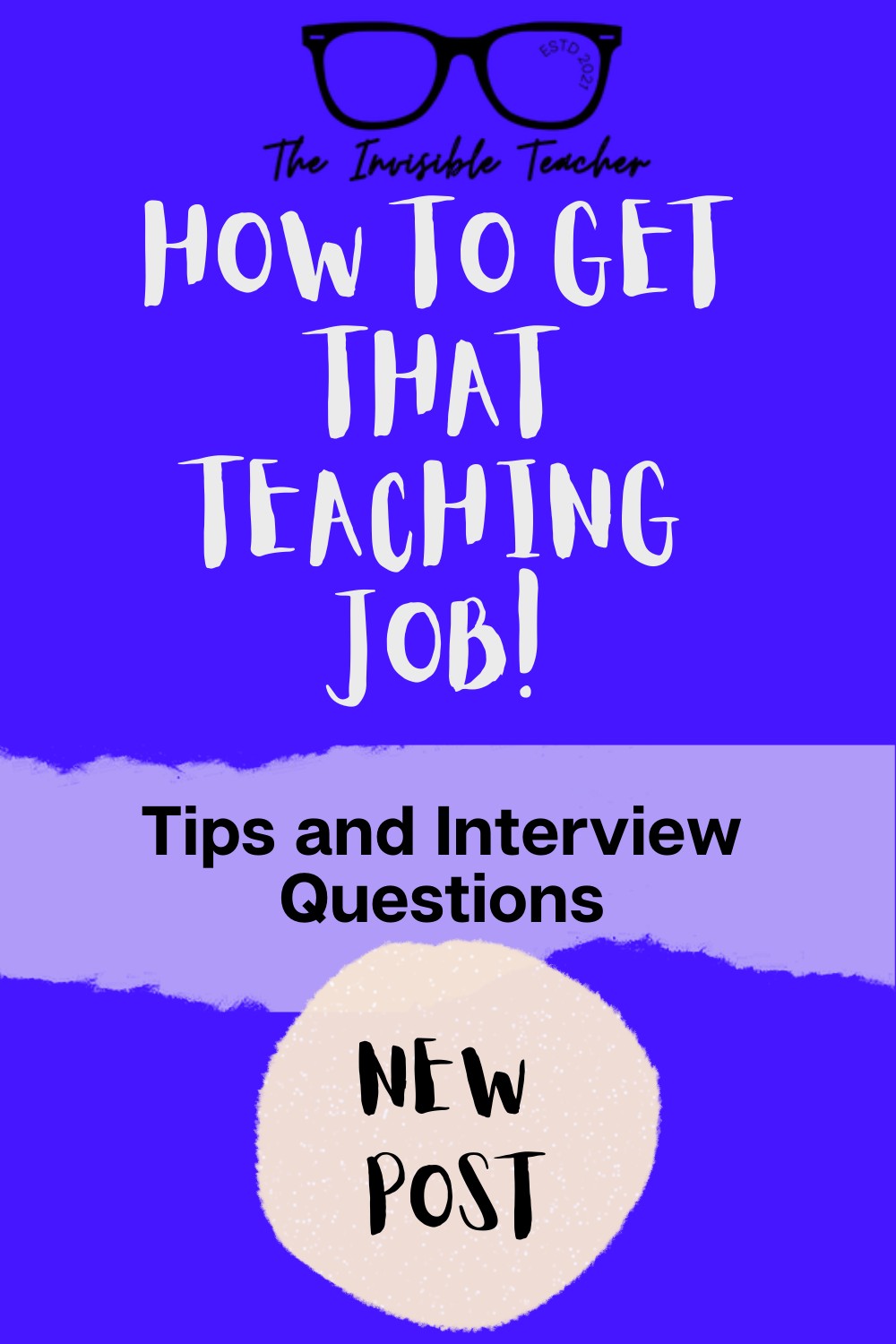Fellow teachers, we understand. You want to move on and bag that new job you’ve seen on the TES job site. You know you’ve got the experience and the personal skills to win the job but how do you make sure you are a champion at that interview?
We’ve all had that feeling of walking out of an interview feeling we’ve really nailed it and we’ve all felt the opposite too: replaying an interview over and over; hearing ourselves fluff up an obvious answer like you’re in a really awkward comedy sketch. It’s life.
Teaching interviews? They’re not the easiest. Interviews are hard enough to navigate without the added pressure of having to teach a class we don’t know too.
The Good, the Bad and the Weird

Back in the early 2000s, my first job interview as a newly qualified teacher consisted of the head teacher (who was 12 weeks away from retirement) inviting me into his office, offering me a cup of tea and then asking me what I’d do if a student made a pass at me. That’s it. Thankfully I didn’t make any tasteless jokes so I got the job. By 10am I was celebrating with my friend (who also got a job in the same department) with breakfast and a pint. Oh, to be 21.
They can be different
Of course, I’ve not always been that lucky. Amongst the more recent interviews I’ve had, included one school who not only left the candidates waiting for two and a half hours without a drink while they deliberated (and THEN sent us all home) and a very prestigious private school whose process included 5 separate interviews. I’ve even had one where the HOD had a parent meeting during my interview lesson. It can be a mixed bag.
Assuming the school you want to work at is run by mostly sane people, follow these steps to secure your new post!
How to ace it
So, you’ve done your research, written an excellent application and they’ve sent you an invite to interview. Now what?
1. The Outfit
Never judge a book by its cover? Come on, we know that that doesn’t apply to the interview process. The first thing candidates do is eye each other up, deciding who is the lion and who is the lamb. Your dress sense is what your potential employers look at first. If you look scruffy, it may suggest you are unorganised.
The cover is everything.
So, dress smartly. There is an element of having a more relaxed dress when you work there but you need to up your game before you metaphorically put your feet up.
By this I would recommend:
Women
Trousers, a smart blouse/ top and a blazer jacket with appropriate shoes. So, no trainers (even if they are black) and no Dr Martens.
Men
Suit Trousers and matching jacket with a white shirt and a plain tie. Always a tie. Smart shoes and a bag that is classes as smart. A satchel is always a good choice.
Be smart and look the part.
2. Sort out your important documents!
Word of warning. Don’t go into a interview without your DBS; you’ll look like a fool – and an unorganised one at that. Yeah, that happened.
Take a folder with all of your important documents so you can have them to hand while they are interviewing other candidates.
Take these:
- Recent DBS.
- Certificates – Degree and Teaching qualification will suffice (I have never known these to be looked at let alone your A Level and GCSEs, so don’t bother with them).
- Your application form and letter of application/ C.V (whatever you submitted) so you can remind yourself what they know about you. They will mostly likely have a copy in front of them too and you want to be on the same page. Literally.
- A notebook and pen – use these to write down notes if you are having a tour; you can use these notes and questions to help you out in your interview.
- Your resources. And spare resources. Always have spare resources. Also, back up your lesson PPT on a memory stick and have that too, just in case.

3. Research the School
Yes, that means going through their webpage and knowing what type of school it is. Know how many students there are, what denomination it is if it has a religious affiliation, who the head teacher is and a little history.
- It goes without saying that knowing their latest Ofsted/ ISC report is paramount. This is for you as much as showing them what you know. Are you fully prepared to work in a failing school? This is something they will want to bring up if indeed they are.
- Research what their Ofsted/ ISC report says in terms of progress and their next steps. This usually links to their whole school focus for years to come. And, you know, most often it’s underperforming boys.
- Research the head. How long have they been there? Have they been somewhere else before? Anything that is on their website is yours to be one step ahead. Is this someone you would want to work for?
- Know what they are specialise in. Is it a Sports College? A Performing Arts School? Do they put emphasis on Science and Technology? This might mean you could talk about what you could offer them that adheres to their school focus.
4. Be on time early
Interview at 8:30am? Get there for 8:00am so you can park nearby and find a coffee. Yes, set out super early so you can calm down and do some breathing exercises as well as checking out the local area/ the behaviour of the students as they walk in. You can often get a feel for the school before you walk in their door.
On public transport? It’s even more paramount that you get the earlier train.
5. Know what they’ll ask
Interviews are often very similar. In all the interviews I’ve been to (ok, apart from my first post), I’ve been asked the same questions. The trick is staying on topic when you answer them.
Interview questions you can ace:
- How do you think your lesson went? The lesson gained pace in the middle with clear progress being made in XYZ.
- What would you improve and why? XYZ at the back was struggling with XYZ and I would have spoken to him 1-2-1 after the lesson since more than 80% of students worked well with the task. I would have put in some more scaffolding at XYZ point in hindsight.
- What would be the next sequence of lessons? Discuss how you would extend the lessons briefly given the topic of your lesson.
- What makes an outstanding classroom practitioner? I believe an outstanding classroom practitioner is one that is flexible enough to reflect on what is going on in the classroom and adapt it accordingly. That might mean that the lesson looks very different to what is planned but it might mean that to get to point B there is a lot more scaffolding and modelling needed, and that’s ok.
- What makes an outstanding lesson? An outstanding lesson is where all students are engaged and are learning something. The teacher should again be willing to adapt to the needs of the class.
- How do you differentiate? Outcome/ Teacher/ Resource (depends on the belief of the school).
- Why do you teach your subject? Various – E.G English – To enable access to other subjects and to be able to be fully functioning citizens that can express an opinion appropriately as well as accessing cultural capital that they might not be able to (due to the demographic) through a variety of literature.
- How do you go out of your way to advance your own teaching practise? Talk about CPD you have done at previous posts/ university and your willingness to do self research too. Also talk about learning from other members of your department/ other departments.
- What could you bring to our school? Various – hobbies could be mentioned.
- Why should we employ you? Talk about what skills you can offer as well as your professionalism.
- What extra-curricular clubs could you offer the school? Link to your experience and hobbies too; they want to see your human side.
- What would you do if (generic safeguarding question(s))? Don’t joke no matter how ridiculous the questions are.
BONUS TIP: You are interviewing too!
I promise, it’s normal to feel like you are the only one on the spot, but remember, you are interviewing THEM too! If the school is not right for you, feel free to politely leave.
Ask them what they can do for you. Speak to other members of staff and gage whether they seem happy to be working there. You are going to spend a lot of your life at work, so make sure you want to be there; don’t settle for less that you are worth.
And smile. It’s catching.
If you want to share interview tips and stories in our forum, feel free to join and start chatting!
The Invisible Teacher has been working in inner-city secondary schools for 12 years across the heart of England.


